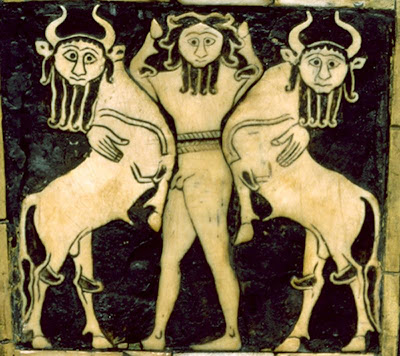Babylon begins with the origins of Sumerian civilization in the 4th millennium BCE, and ends with the fall of Babylon to Cyrus the Persian. Kriwaczek does a good job of telling a coherent story about Mesopotamia as a single civilization without ignoring the great changes that took place over this vast span of time, or the regional differences that sometimes divided the land. He gives both a framework narrative and many well chosen details, some drawn from written documents, others from archaeological fieldwork.
I was interested to note that when it comes to explaining the rise of civilization, economic determinism seems to be dead. This popular writer did not even give a nod toward theories that the first cities arose from trade. His model of the rise of Eridu begins with a shrine on the shore of a sacred lake, around which a festival grew up, which slowly turned into a settlement. When I was in college these ideas were new and radical, and now they have become the status quo. Thus long have I lived.
I would share dozens of Kriwaczek's stories if I had time and space. I loved a little excerpt he presented from the famous King List, describing an anarchic period:
Who was king? Who was not king?But I must limit myself. I choose this gem:
When the omens were particularly unfavourable it was the custom to spirit the monarch away to safety and temporarily place a commoner on the throne to receive whatever blow fate had in store for the man in the palace. Around 1860 BCE destiny spoke, probably in the form of a lunar eclipse, threatening the Sumerian King Irra-Imitti of Isin. "That the dynasty might not end," explains the later text that Assyriologists cale the Chronicle of Early Kings, the sovereign "made the gardener Enlil-Bani take his place upon the throne and put the royal tiara upon his head." Thus legitimized, the pretend-ruler officiated in the temple rites and performed all other royal duties.I have a few complaints. Kriwaczek dwells too much on what was first, which is no doubt a great temptation when writing about the oldest civilization we know. But older examples of things turn up all the time, and if you say that Eridu was important because it was the first city then you will have trouble justifying your work if somebody turns up an older one. Kriwaczek also makes too many allusions to recent events in Iraq for my taste.
The usual course of events would have been to wait until the danger had passed and then put the temporary monarch to death. But fate was not as blind as she is usually described and seemed to have been perfectly able to distinguish the fake royal from the real: "Irra-Imitti died in his palace after swallowing boiling broth. Enlil-Bani, who was upon the throne, did not relinquish it and so was established as king." Enlil-Bana was remarkably successful, managing to maintain his rule almost a quarter of a century.
But on the whole, this is a terrific book, and I recommend it highly.








No comments:
Post a Comment